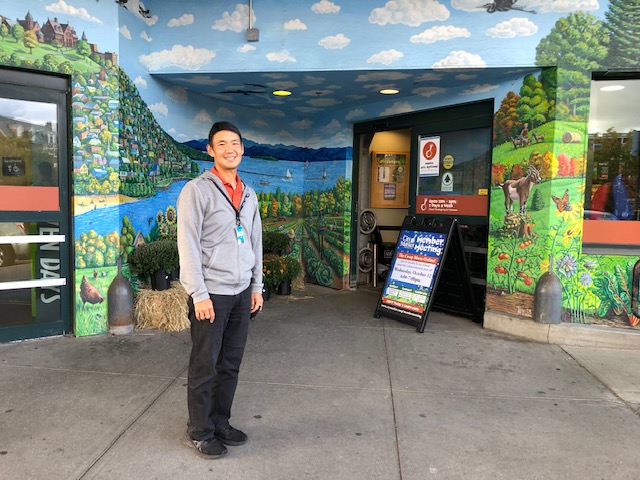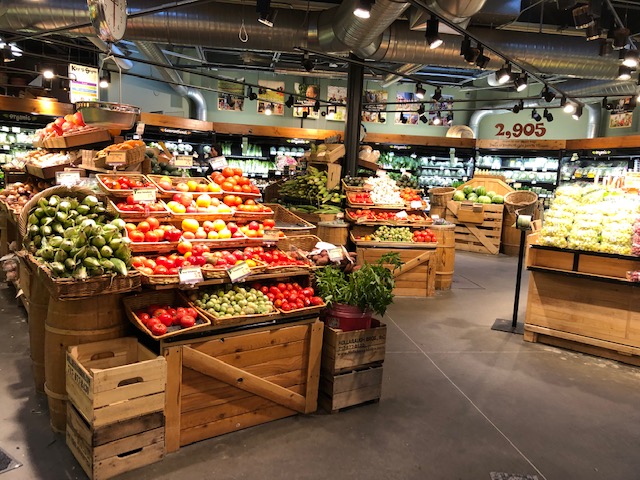
Located in the heart of downtown Burlington, Vermont, the City Market / Onion River Co-op grocery store is worthy of business study (and a visit if you’re in the area). My experience of the market began by strolling past the elaborate bicycle parking and wildflower gardens up to the entrance, which was framed by bright murals of flowers and vegetables painted by a local artist. Upon entering, my senses were immediately overwhelmed by the meticulous stacks of gorgeous produce including five types of organic kale (unencumbered by plastic packaging). I was excited to find affordable, bulk, fair trade coffee … and what’s this: Lego-my-Egos! (shhhh…guilty pleasure we won’t talk about) — What were they doing in a natural foods grocery store? Isn’t that what this was? Well, yes, but with a twist.

In 1973 Onion River Co-op was born as a natural food buying club. But it changed form and name in 2002 when it leased a much larger space owned by the city of Burlington. The city council approved the lease on the condition that the store meet the needs of an economically diverse population; requiring that at least 40% of the store’s products be conventional and affordable. And thus, Onion River was converted to City Market / Onion River Co-op — a hybrid co-op grocery store, offering both natural and conventional products — with a majority of its produce supplied by local farms. Members and non-members can shop at the store, but members receive a variety of perks for their $15 annual membership. Members make up about 60% of its customers (now over 12,000 member-owners).
The City Market Co-op provides an excellent example for businesses in Ohio and beyond of how attention to environmental, social, and governance (ESG) standards can maximize business success (Learn more about ESG standards here). The following are some of the Co-op’s standout ESG-related business practices gathered from a subsequent interview I had with John Tashiro, General Manager of City Market.
Focus on Being a Good Community Partner. City Market Co-op is conscious about being a good community partner. Do good by your community and they will do good by you. To this end:
- The Co-op offers high quality products at affordable prices. Often the tendency at urban and rural grocery stores is to offer low quality produce and products at inflated prices; City Market does the opposite. And while urban coffee shops tend to restrict seating and bathrooms to avoid homeless (or other less desirable clientele), City Market offers a café and accessible restrooms that are welcoming to all.
- The Co-op supports local nonprofits. City Market partners with approximately 16 local nonprofits – supporting them both financially and by initiating creative ways of encouraging volunteerism. Co-op members that volunteer at the nonprofits receive discounts on their purchases at the Co-op. The more hours volunteered, the greater the savings on one’s shopping bill. Plus, the Co-op has a “Rally for Change” program where customers are given the option to round up their purchase. Approximately $10,000 per month is collected and divided among three nonprofits. Also, all monies from the annual Christmas tree sale (a long-standing store tradition) are donated to support programs that house the unhoused.
- The Co-op supports local businesses. The Co-op provides loans to local growers with 0% interest for 3-5 years and the loans can be paid back in cash or products. Mr. Tashiro emphasized, “We will never turn down a request for a conversation with a local grower.” And he explained that the Co-op purposely chooses not to have an in-house bakery in order to support local bakeries by instead offering their products for sale. Also, the Co-op provides low or no interest loans to other cooperative businesses in Vermont. Note that cooperatives helping other co-ops is one of the guiding principles of cooperatives.
Commitment to Sustainable Business Practices. Sustainability is a major focus under Mr. Tashiro’s leadership. He’s committed to the Co-op taking actions that reflect this, even when doing the right thing is not the easiest or cheapest. For example, he explained that grocery stores are historically huge polluters because of their refrigeration systems and these systems worsen as they age. The City Market takes extraordinary efforts to clean and service its existing refrigeration and in their new store they chose to install a cutting-edge refrigeration system that significantly reduces emissions (approximately 1000x better!). When I asked if the system would eventually save costs, he said probably not, but it was “the right thing to do.” As I researched deeper into the issue, I learned that international and national standards and laws continue to change and eventually these systems will be required. As always, forward-thinking business decisions will inevitably payout over reactionary approaches.
Commitment to a Healthy, Happy, Diverse Work Culture. The Co-op makes efforts to hire a diverse workforce by consciously hiring BIPOC workers, new Americans, and from within the LGBTQ+ community. Efforts are made to provide a safe, supportive, and fun community for its workers. The Co-op provides a plethora of activities and training that support its diverse workforce and their families. Mr. Tashiro added that they not only offer very competitive pay, but also top tier healthcare insurance for all workers. The Co-op employees 330 workers including 50 managers and the employees have a union. Mr. Tashiro noted that no employees were laid off or let go during Covid. “Our workers are our top priority.”
With all these notable business practices in place that take care of both its workers and the local community, it’s no wonder The City Market Co-op has been so successful.
